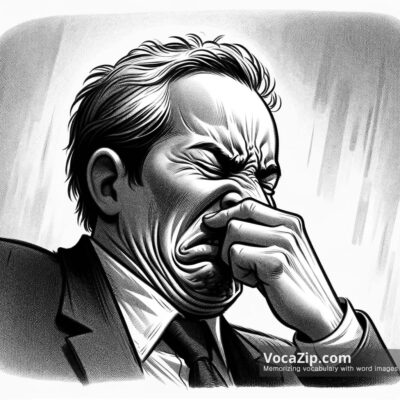disgusting meaning
disgusting :
very unpleasant, causing dislike
adjective
▪ The food was disgusting.
▪ The food was very bad.
▪ The smell was disgusting.
▪ The smell was very bad.
paraphrasing
▪ revolting – very unpleasant
▪ repulsive – causing strong dislike
▪ offensive – very unpleasant
▪ nauseating – making you feel sick

Pronunciation
disgusting [dɪsˈɡʌstɪŋ]
The stress is on 'gust' and sounds like 'dis-gust-ing'.
Common phrases and grammar about disgusting
disgusting - Common meaning
adjective
very unpleasant, causing dislike
Part of Speech Changes for "disgusting"
▪ disgust (noun) – strong dislike
▪ disgusted (adjective) – feeling strong dislike
Common Expressions with "disgusting"
▪ disgusting smell – very bad smell
▪ disgusting taste – very bad taste
▪ find something disgusting – think something is very bad
▪ look disgusting – appear very bad
Important examples of disgusting in TOEIC
Vocabulary examples from the TOEIC test
In TOEIC vocabulary questions, disgusting is often used to describe something very unpleasant.
Example of a confusing word: disgusted (feeling revulsion)
Grammar examples from the TOEIC test
Disgusting is used as an adjective to describe nouns in TOEIC grammar questions.
disgusting
Idioms and fixed expressions in TOEIC
disgusting behavior
'very bad actions', used to describe actions that cause strong dislike.
make one's stomach turn
means 'to cause a feeling of sickness or disgust'.
Differences between similar words and disgusting
disgusting
,
revolting
differences
Disgusting and revolting both mean very unpleasant, but revolting often implies a stronger reaction.
disgusting
,
repulsive
differences
Disgusting means very unpleasant, while repulsive often means causing a strong feeling of dislike or disgust.
Words with the same origin as disgusting
The origin of disgusting
The word's etymology is not clear.
Word structure
The analysis of the word's composition is unclear.
Words with the same origin
The word's root is unclear or difficult to confirm.
Please select an image in the quiz
Previous post and next post


requisition
1624
an official request for something
noun ┃
verb ┃
Views 1






